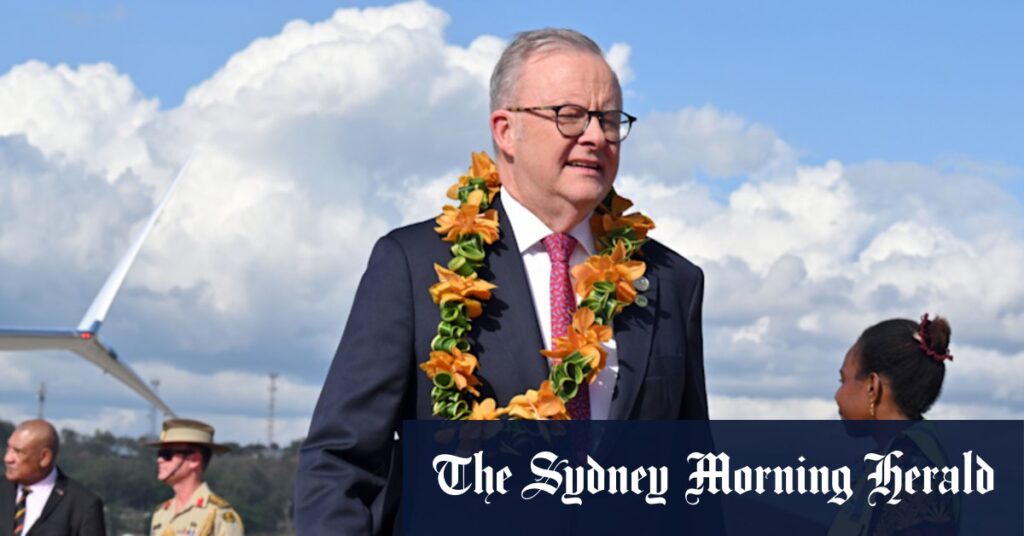
Australia and Papua New Guinea are racing against time to finalize a historic defence treaty before Prime Minister Anthony Albanese concludes his visit to the Pacific nation. The urgency comes after PNG’s cabinet was unable to approve the pact due to difficulties in assembling a quorum amidst the country’s 50th independence anniversary celebrations.
Albanese, alongside senior ministers, expressed optimism about the treaty’s signing. However, the celebrations have posed logistical challenges, potentially delaying the agreement until after Albanese’s visit to Port Moresby ends on Wednesday. A failure to sign the treaty during the visit would mark another setback for Albanese, following Vanuatu’s unexpected shelving of a security deal with Australia last week.
Details of the Pukpuk Treaty
The treaty, known as the “Pukpuk Treaty” — named after the Pidgin word for “crocodile” — aims to elevate the bilateral relationship to the level of Australia’s alliances with the United States and New Zealand. It includes a clause for mutual defence, committing both nations to “act to meet the common danger” if either is attacked. Additionally, the pact would allow the Australian Defence Force unimpeded access to designated facilities in PNG and enable personnel exchanges between the two countries’ militaries.
Prime Minister Albanese told ABC TV, “It was due to go to the PNG cabinet yesterday. There’s celebrations going on everywhere, so they weren’t able to have a quorum … But they’re going through that process and it has overwhelming support and it’ll be a very good thing.” He remained hopeful about advancing the treaty, stating, “We will be able to advance the treaty tomorrow.”
Strategic Implications and Regional Dynamics
This development follows growing strategic competition in the Pacific, with concerns about Chinese influence in the region. Kurt Campbell, former Indo-Pacific adviser to President Joe Biden, suggested that last-minute challenges with the treaty might involve Chinese interference. “I think it suggests that this is a region at strategic play, and that China is relentless,” Campbell said at the National Press Club.
Campbell praised Australia’s initiatives to strengthen ties with PNG, describing them as “ingenious and important.” The political landscape in the Pacific is increasingly contested, with nations like China seeking to expand their influence.
Expert Opinions and Concerns
Oliver Nobetau, project director at the Lowy Institute’s Australia-PNG network, highlighted the logistical challenges faced by PNG politicians, who are spread across the country. He noted that a delay in signing the treaty could attract criticism for Albanese, especially if two Pacific agreements fall through within a week.
Joanne Wallis, a professor of international security, expressed concerns about the treaty’s mutual defence clause potentially entangling Australia in conflicts, particularly regarding the PNG province of Bougainville, which plans to become independent by 2027. She also raised questions about Australia’s response to potential conflicts between PNG and Indonesia.
“The ‘China card’ shouldn’t be a blank cheque that excuses the government from making the case for the PNG treaty,” Wallis stated, emphasizing the need for transparency about the treaty’s implications and costs.
Historical Context and Future Prospects
The Pukpuk Treaty echoes the ANZUS Treaty signed in 1951 between Australia, the US, and New Zealand, which also included mutual defence provisions. Article four of the draft agreement between Australia and PNG states, “In the event of a security related development that threatens the sovereignty, peace or stability of either party, the parties shall consult at the request of either party and consider whether any measures should be taken in relation to the threat.”
As the negotiations continue, the treaty represents a significant step in fortifying Australia-PNG relations. Despite the current delays, senior government sources remain confident that the treaty will be signed soon, reinforcing the strategic partnership between the two nations.
In conclusion, while logistical challenges have temporarily stalled the signing of the Pukpuk Treaty, the agreement holds substantial promise for enhancing regional security and cooperation. The coming days will be crucial in determining the treaty’s fate and its impact on the geopolitical dynamics of the Pacific.







